Filter by
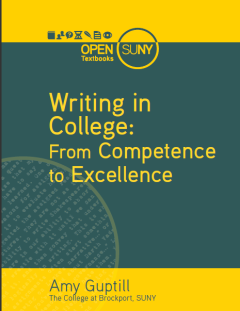
Writing in College: from Competence to Excellence
Writing in College is designed for students who have largely mastered high-school level conventions of formal academic writing and are now moving beyond the five-paragraph essay to more advanced engagement with text. It is well suited to composition courses or first-year seminars and valuable as a supplemental or ecommended text in other writingintensive classes. It provides a friendly, down-to…
- Edition
- 2
- ISBN/ISSN
- 978-1-942341-21-5
- Collation
- -
- Series Title
- -
- Call Number
- 808

Writing in College: from Competence to Excellence
Writing in College is designed for students who have largely mastered high-school level conventions of formal academic writing and are now moving beyond the five-paragraph essay to more advanced engagement with text. It is well suited to composition courses or first-year seminars and valuable as a supplemental or ecommended text in other writingintensive classes. It provides a friendly, down-to…
- Edition
- 2
- ISBN/ISSN
- 978-1-942341-21-5
- Collation
- -
- Series Title
- -
- Call Number
- 808
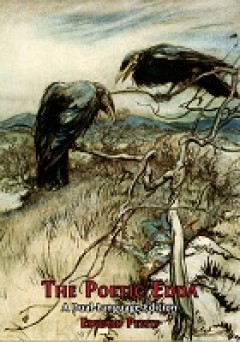
The Poetic Edda: A Dual-Language Edition
This book is an edition and translation of one of the most important and celebrated sources of Old Norse-Icelandic mythology and heroic legend, namely the medieval poems now known collectively as the Poetic Edda or Elder Edda. Included are thirty-six texts, which are mostly preserved in medieval manuscripts, especially the thirteenth-century Icelandic codex traditionally known as the Codex Regi…
- Edition
- Ed. 1
- ISBN/ISSN
- 9781800647725, 9781800647732
- Collation
- 894
- Series Title
- -
- Call Number
- 801 PET p
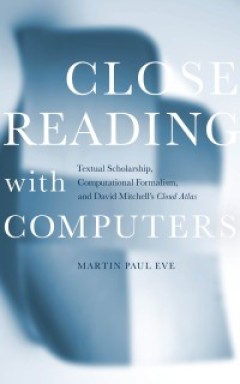
Close Reading with Computers: Textual Scholarship, Computational Formalism, a…
Rather than working at the usual scales of distant reading, this book shows what happens when we bring techniques from the digital humanities to bear on a single novel for close readings.
- Edition
- -
- ISBN/ISSN
- 9781503609372
- Collation
- -
- Series Title
- -
- Call Number
- 823.914
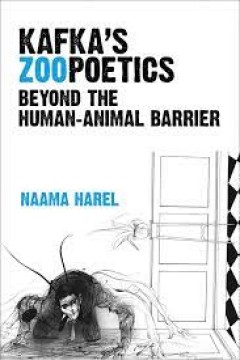
Kafka's Zoopoetics : Beyond the Human-Animal Barrier
Kafka's Zoopoetics is the first extensive account of animals and human-animal relations in the work of Franz Kafka. The book appeals to a broad audience, including scholars and students of Comparative Literature, German Studies, Cultural Studies, and Human-Animal Studies. Kafka’s pivotal role in world literature cannot be overestimated. Exploring the multidimensional relations between humans …
- Edition
- -
- ISBN/ISSN
- 9780472131792
- Collation
- 216 halaman
- Series Title
- -
- Call Number
- 800 HAR k
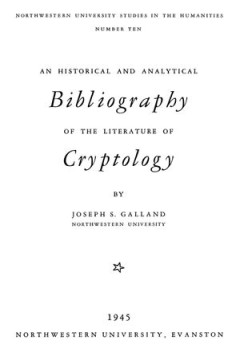
An Historical and Analytical Bibliography of the Literature of Cryptology
Originally published in 1945, An Historical and Analytical Bibliography of the Literature of Cryptology provides a comprehensive listing of the most important works written up to that time on cryptography, as well as works in related fields in which cryptography appears. It includes a vast range of materials: scientific and technical works dealing with military, diplomatic, and commercial uses …
- Edition
- -
- ISBN/ISSN
- 9780810138414
- Collation
- -
- Series Title
- -
- Call Number
- 800 GAL h
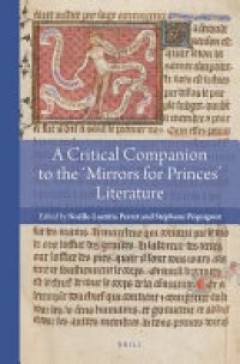
A Critical Companion to the 'Mirrors for Princes' Literature
Why devote a Companion to the "mirrors for princes", whose very existence is debated? These texts offer key insights into political thoughts of the past. Their ambiguous, problematic status further enhances their interest. And although recent research has fundamentally challenged established views of these texts, until now there has been no critical introduction to the genre. This volume theref…
- Edition
- -
- ISBN/ISSN
- 9789004523067
- Collation
- vii, 556 p
- Series Title
- -
- Call Number
- 809
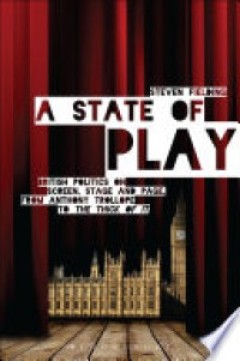
State Of Play
This book is available as open access through the Bloomsbury Open Access programme and is available on www.bloomsburycollections.com. A State of Play explores how the British have imagined their politics, from the parliament worship of Anthony Trollope to the cynicism of The Thick of It. In an account that mixes historical with political analysis, Steven Fielding argues that fictional depiction…
- Edition
- -
- ISBN/ISSN
- 9781849669818
- Collation
- viii, 272 p
- Series Title
- -
- Call Number
- 820.935841082
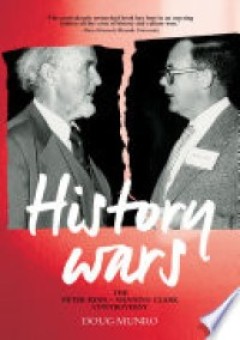
History Wars
‘In 1993, Manning Clark came under severe (posthumous) attack in the pages of Quadrant by none other than Peter Ryan, who had published five of the six volumes of Clark’s epic A History of Australia. In applying what he called “an overdue axe to a tall poppy”, Ryan lambasted the History as “an imposition on Australian credulity” and declared its author a fraud, both as a historian a…
- Edition
- -
- ISBN/ISSN
- 9781760464776
- Collation
- -
- Series Title
- -
- Call Number
- 823.91209
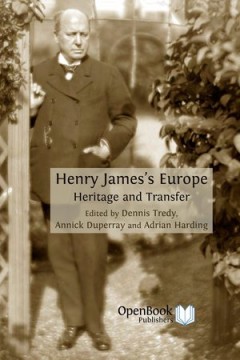
Henry James' Europe : Heritage and Transfer
As an American author who chose to live in Europe, Henry James frequently wrote about cultural differences between the Old and New World. The plight of bewildered Americans adrift on a sea of European sophistication became a regular theme in his fiction.
- Edition
- -
- ISBN/ISSN
- 9781906924386
- Collation
- 316 halaman
- Series Title
- -
- Call Number
- 800 TRE h
 Computer Science, Information & General Works
Computer Science, Information & General Works  Philosophy & Psychology
Philosophy & Psychology  Religion
Religion  Social Sciences
Social Sciences  Language
Language  Pure Science
Pure Science  Applied Sciences
Applied Sciences  Art & Recreation
Art & Recreation  Literature
Literature  History & Geography
History & Geography